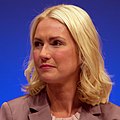Second Cabinet of Manuela Schwesig Schwesig II | |
|---|---|
 11th Cabinet of Mecklenburg-Vorpommern | |
| 15 November 2021 – | |
 Manuela Schwesig at the SPD federal conference in June 2017 | |
| Date formed | 15 November 2021 |
| People and organisations | |
| Minister-President | Manuela Schwesig |
| Deputy Minister-President | Simone Oldenburg |
| No. of ministers | 8 |
| Member parties | Social Democratic Party The Left |
| Status in legislature | Coalition government (Majority) |
| Opposition parties | Alternative for Germany Christian Democratic Union Alliance 90/The Greens Free Democratic Party |
| History | |
| Election | 2021 Mecklenburg-Vorpommern state election |
| Legislature term | 8th Landtag of Mecklenburg-Vorpommern |
| Predecessor | First Schwesig cabinet |
The Second Schwesig cabinet is the incumbent state government of Mecklenburg-Vorpommern, sworn in on 15 November 2021 after Manuela Schwesig was elected as Minister-President of Mecklenburg-Vorpommern by the members of the Landtag of Mecklenburg-Vorpommern. It is the 11th Cabinet of Mecklenburg-Vorpommern.
Contents
It was formed after the 2021 Mecklenburg-Vorpommern state election by the Social Democratic Party (SPD) and The Left (LINKE). Excluding the Minister-President, the cabinet comprises eight ministers. Six are members of the SPD and two are members of The Left.






